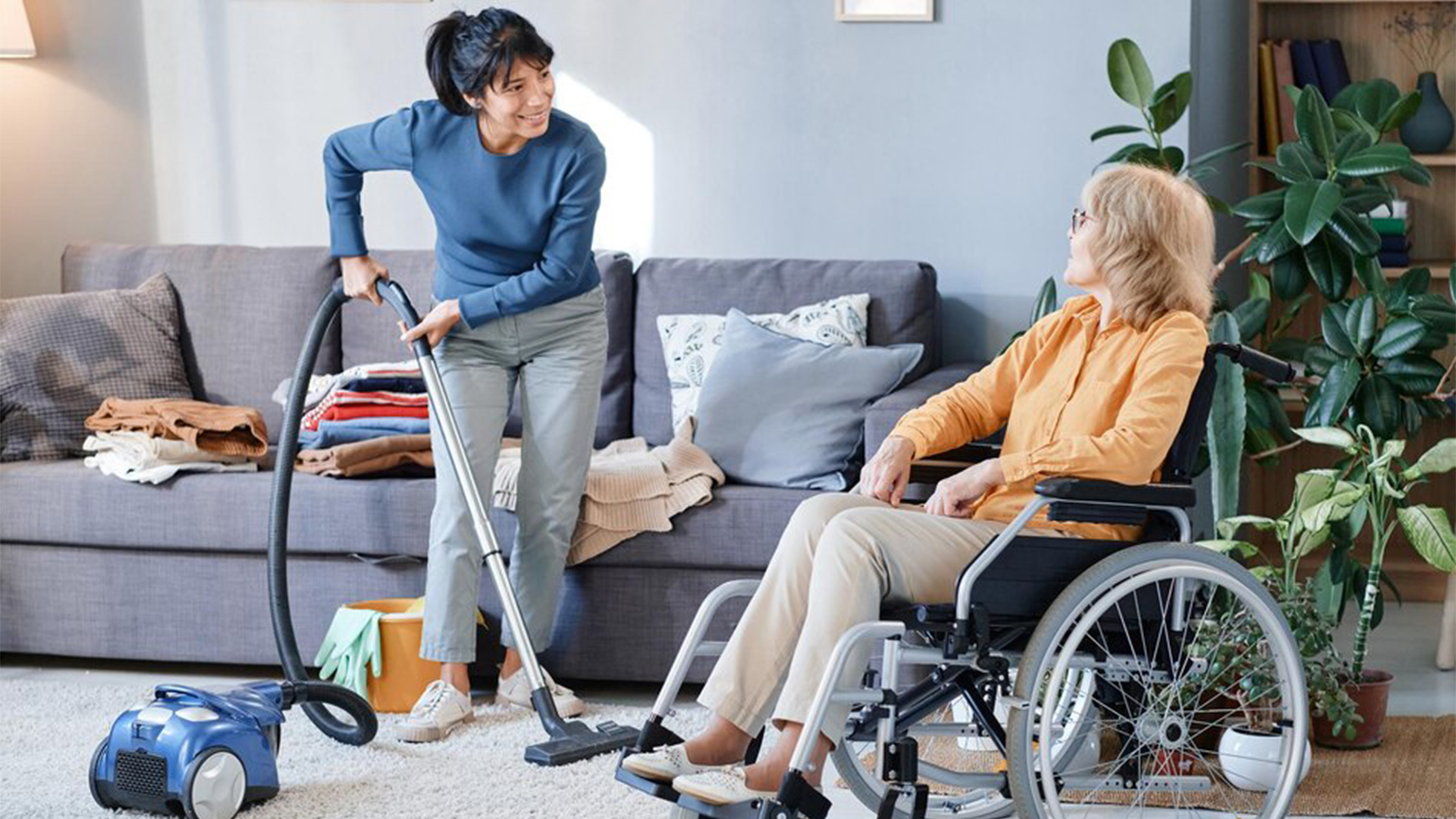Top 10 Ways why ndis providers are transforming disability support at home
Top 10 Ways why ndis providers are transforming disability support at home
Blog Article
The Relevance of Disability Services and the Effect of Home Care Providers
Disability services are necessary for boosting the lives of individuals with handicaps. They supply vital assistance that fosters independence and well-being. Home care providers play an essential duty in this framework by supplying individualized help tailored to special requirements. This assistance not only advantages individuals however also eases the stress on household caregivers. Comprehending these dynamics discloses a deeper connection in between treatment, autonomy, and area. What exists in advance for these critical solutions and their impact?
Comprehending Special Needs Solutions
While several may not totally comprehend the complexities of disability services, they play a vital role in improving the quality of life for individuals with disabilities. These solutions include a broad array of support group developed to aid individuals in maneuvering everyday difficulties. From supplying access to education and employment possibility to promoting health care and rehabilitation, impairment services intend to promote freedom and inclusion.Key parts include case administration, advocacy, and assistive innovation, which help individuals attain individual goals. Furthermore, community-based programs commonly cultivate social links, reducing feelings of seclusion. Various companies and government entities team up to assure that individuals receive tailored assistance according to their unique demands. Understanding these solutions is essential, as they equip people with disabilities to lead fulfilling lives, proactively join their communities, and recognize their possibility. Inevitably, effective disability solutions are fundamental to promoting equity and accessibility for all.

The Role of Home Treatment Providers
Home care companies play a crucial function in supplying tailored support to people with handicaps, permitting them to preserve independence in their own homes - ndis providers. These specialists offer a large range of solutions customized to meet the distinct requirements of each person, guaranteeing that support is both relevant and efficient. They assist with everyday activities such as meal preparation, individual hygiene, and medicine monitoring, which are vital for improving the high quality of life for those they serve.Moreover, home care service providers function as an important link in between individuals and their medical care needs, facilitating communication with clinical professionals and collaborating required services. Their visibility additionally eases the burden on family members caretakers, promoting a much healthier vibrant within families. By promoting a risk-free and encouraging setting, home treatment suppliers encourage individuals with disabilities to involve with their areas, pursue personal rate of interests, and eventually lead fulfilling lives while continuing to be in the convenience of their homes
Personalized Care and Assistance
Individualized care and support are vital elements of effective home treatment solutions, as they deal with the specific demands and preferences of everyone with a disability. Home treatment companies evaluate the unique requirements of each client, establishing tailored plans that prioritize their health, convenience, and health. This customized technique not only enhances the top quality of treatment however likewise cultivates a feeling of dignity and respect.Caregivers are trained to adjust their techniques, making certain that services straighten with the client's lifestyle, cultural background, and personal preferences. Regular communication between clients and caretakers assists to improve treatment plans, attending to any type of changing requirements without delay. In addition, the focus on personalized assistance encourages the advancement of depend on and rapport, which can substantially boost the overall caregiving experience. Inevitably, personalized treatment and support empower people with disabilities to get the help they need in a manner that really feels considerate and verifying.
Enhancing Self-reliance for People
Enhancing independence for people with handicaps is an essential goal within home care solutions. These services supply tailored assistance that equips customers to engage in day-to-day tasks autonomously (ndis providers near me). By providing support with personal treatment, movement, and household tasks, home treatment companies make it possible for people to preserve a feeling of control over their lives. This freedom cultivates self-esteem and durability, vital elements in the journey towards independence.Furthermore, home treatment solutions typically include skill-building possibilities that instruct people adaptive techniques, improving their ability to do tasks separately. This support not just fulfills immediate requirements however likewise advertises lasting self-sufficiency. In addition, caretakers can assist in creating an atmosphere that suits specific preferences and capabilities, making sure that customers feel comfy and safe. Overall, the concentrate on improving freedom through home treatment solutions is considerable in advertising self-respect and lifestyle for individuals with impairments
Structure Neighborhood Inclusivity
While cultivating individual independence is essential, developing community inclusivity for people with impairments is similarly important. Inclusivity enhances social connections, enabling people to get involved fully in neighborhood life. Community interaction campaigns, such as recognition projects and comprehensive events, play a significant duty in damaging down obstacles i loved this and difficult false impressions regarding disabilities.Accessible public areas and transportation options are vital elements that assist in engagement and assimilation. Cooperation among regional organizations, organizations, and campaigning for groups can produce helpful networks that urge inclusivity. Furthermore, training neighborhood members on special needs understanding promotes empathy and promotes a society of acceptance.Ultimately, an inclusive community not only benefits individuals with disabilities but enriches the whole social material by welcoming diversity. By recognizing and dealing with the special requirements of individuals with specials needs, neighborhoods can grow an atmosphere where everyone has the possibility to prosper and add meaningfully.
The Effect on Family Members and Caregivers
Lots of family members and caregivers of individuals with handicaps experience an extensive influence on their every day lives and emotional wellness. The obligations related to caregiving can result in significant physical and psychological stress, usually leading to caretaker exhaustion. This can lessen their capability to offer effective assistance and develop a nurturing atmosphere. Furthermore, the psychological toll can bring about feelings of seclusion and anxiousness, impacting family members dynamics and relationships.Access to impairment services and home care companies can minimize some of these problems by supplying needed support Recommended Site and resources. These services enable family members to share caregiving obligations, permitting caregivers to take breaks and concentrate on their own health and wellness. Enhanced assistance networks foster a feeling of community, which can enhance psychological durability. Ultimately, the existence of detailed impairment solutions especially impacts families, promoting far better health outcomes and boosting the lifestyle for both caretakers and individuals with handicaps.
Future Patterns in Handicap Solutions and Home Care
As the landscape of handicap services and home care develops, innovation integration is coming to be increasingly prominent. This change permits even more customized assistance models that satisfy specific demands and choices. By harnessing cutting-edge devices, providers can improve treatment high quality and boost results for those they offer.
Technology Assimilation in Care
The combination of technology in impairment services and home treatment is transforming the means treatment is supplied and experienced. Advanced tools such as telehealth platforms, wearable tools, and smart home systems enhance accessibility and communication between caregivers and customers. These modern technologies assist in real-time monitoring of health and wellness metrics, permitting for prompt interventions and personalized care changes. In addition, mobile applications encourage people with specials needs to handle their own care strategies and gain access to sources extra effectively. Automation and fabricated knowledge are streamlining administrative jobs, freeing up caretakers to concentrate on giving quality assistance. As innovation proceeds to advance, its assimilation within these industries assures to improve results, boost independence for customers, and enhance resource allotment for suppliers.
Customized Assistance Models
While typical care models frequently take on a one-size-fits-all strategy, the future of impairment solutions and home treatment is progressively leaning towards personalized support versions that satisfy the one-of-a-kind requirements of each article source individual. These versions highlight collaboration between care companies, patients, and their family members, guaranteeing that services straighten with particular obstacles and personal preferences. By leveraging evaluations and responses, suppliers can customize treatments, whether they involve daily living assistance, therapeutic activities, or emotional assistance. This individualized method not only enhances the top quality of treatment however additionally promotes greater freedom and wellness among people with disabilities. As awareness of these advantages grows, customized support versions are poised to come to be the criterion in handicap services and home care, transforming the landscape of treatment delivery.
Frequently Asked Questions
What Certifications Do Home Care Providers Normally Required?
Home care carriers normally call for a secondary school diploma or equivalent, completion of a state-approved training program, accreditation in mouth-to-mouth resuscitation and emergency treatment, and usually a background check to assure security and dependability for customers.

Exactly How Are Special Needs Solutions Moneyed and Accessed?
Impairment services are normally moneyed via federal government programs, personal insurance policy, and grants. Accessing these services often entails assessments, qualification requirements, and applications, which differ by location and specific demands of people looking for support.
Can Home Care Solutions Be Custom-made for Certain Disabilities?
Home treatment services can without a doubt be customized to meet the unique needs of individuals with particular disabilities. This personalization enables customized assistance, boosting the quality of treatment and improving the overall well-being of clients.
What Are Typical Difficulties Faced by Home Treatment Providers?
Common challenges dealt with by home treatment suppliers include staffing scarcities, insufficient training, communication barriers with households and clients, differing levels of client needs, managing insurance intricacies, and making certain regular quality of treatment across different environments.
Exactly How Can Family Members Find Dependable Impairment Solutions in Their Location?
Households can locate dependable disability solutions by investigating neighborhood firms, speaking with on-line directory sites, looking for referrals from medical care experts, and linking with support system. Extensive evaluations and meetings with solution suppliers assist assure high quality and compatibility with needs. Individualized care and support are important parts of efficient home care services, as they provide to the private demands and preferences of each individual with a disability. By giving aid with individual treatment, movement, and household tasks, home care service providers make it possible for people to preserve a sense of control over their lives. The assimilation of technology in handicap services and home care is reinventing the way care is provided and experienced. While standard care models often take on a one-size-fits-all technique, the future of special needs solutions and home care is increasingly leaning towards customized assistance designs that provide to the distinct demands of each person. Home treatment services can undoubtedly be customized to satisfy the one-of-a-kind requirements of individuals with certain impairments.
Report this page